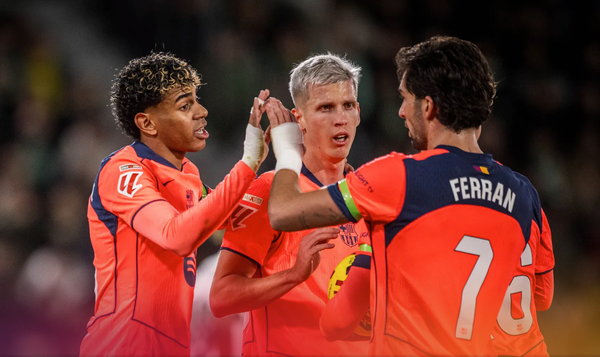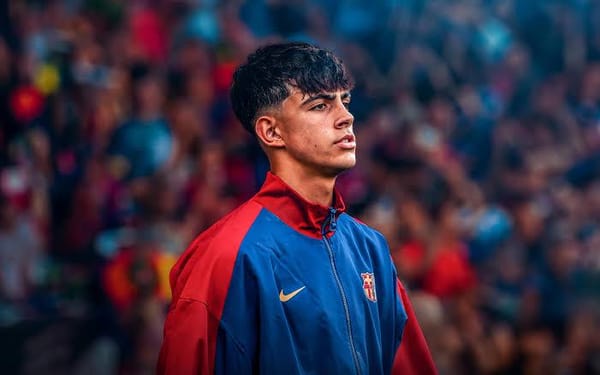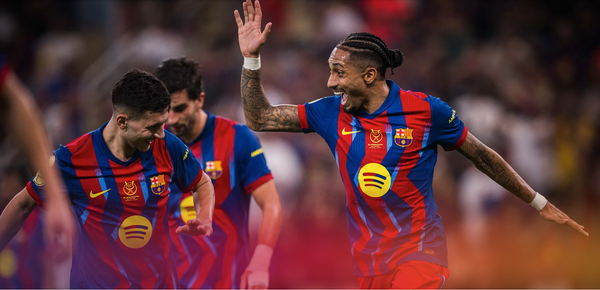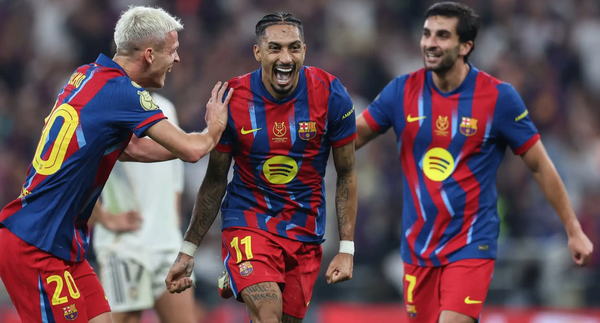Garcia, Nico, Aleix and Ansu - The Barca Weekly
A weekly newsletter series on what happened at Barca this week

A weekly newsletter series on what happened at Barca this week
Barcelona's €25M Bet on Their Crosstown Rival's Crown Jewel
There's something deliciously perverse about Barcelona plucking their new goalkeeper from the clutches of Espanyol, their cross-city neighbours who regard them with roughly the same affection a vegan reserves for a butcher's shop. It's the footballing equivalent of nicking your mate's girlfriend and then asking him to be best man at the wedding.
Joan Garcia, all 6'3" of Catalan shot-stopping excellence, has committed the ultimate act of local treachery by swapping the blue and white of Espanyol for the blaugrana of Barcelona. For €25 million—roughly the price of a decent London flat or Pep Guardiola's weekly turtleneck budget—Barça have secured what many consider La Liga's most promising young goalkeeper.
The numbers tell a story that would even make Madrid fans grudgingly nod in appreciation. Garcia made 145 saves last season with a 74% save percentage, single-handedly keeping Espanyol in La Liga like a goalkeeper-shaped life raft in a sea of mediocrity. He faced 196 shots and conceded just 51 goals—statistics that have now created a tripartite impasse in the Barcelona goalkeeping dugout with 3 goalkeepers (and a stand -in captain) jostling for game time that just isn’t there.
What makes this transfer particularly galling for Espanyol supporters is that Garcia is one of their own. Born in Sallent de Llobregat, he's as Catalan as pan con tomate, having joined the Pericos at 15 and rising through their academy like a promising soufflé in a perfectly calibrated oven. He's the kind of homegrown talent that clubs build their identity around, the poster boy for their youth development.
But Barcelona's gravitational pull in Catalonia is roughly equivalent to a black hole —eventually, everything gets sucked in and Garcia's move represents the natural order of Catalan football.
The irony is that Garcia will now compete with Marc-André ter Stegen, a goalkeeper whose recent form has been about as reliable as the British weather. An undisputed starter from the time he sent Claudio Bravo packing to Man City, Ter Stegen is experiencing a little bit of what he did to Bravo , with Garcia pushing him towards the exit. With alarming signs of fallibility in recent seasons, and errors that would embarrass a Sunday league keeper with a hangover, Ter Stegen’s decline and Garcia's arrival isn't just about competition—it's about succession planning for a position that had become Barcelona's achilles' heel.
Flick, who approaches football with the emotional precision of a Swiss watchmaker, clearly sees Garcia as the long-term solution. The six-year contract until 2031 suggests this isn't a stop-gap signing but a cornerstone piece in Barcelona's reconstruction project. At 24, Garcia has time to develop into Barcelona's number one while learning from the considerable experience—and forgettable mistakes—of his predecessor.
For Espanyol, losing Garcia represents the cruel mathematics of modern football. They unearthed and developed a world-class talent, gave him the platform to shine, and watched helplessly as their slightly more famous neighbour activated his release clause like ordering a takeaway. But that’s the cruel reality of club football. Clubs with more revenue and more chances of winning trophies can ( and will) order takeaways and get away with it, since footballers finite careers of 10-15 years and they (rightfully) want to maximise that opportunity. If it wasn’t Barca it would have been some other big club, but Garcia was going to leave.
Nico Williams and Barcelona's €62M Dance of Desire
Few sagas capture the beautiful absurdity of the game quite like Nico Williams' protracted courtship with Barcelona. It's a tale that has everything: rejected advances, wounded pride, winks on national TV and olive branches.
It would make any soap opera scriptwriter rub his hands in glee.
Williams, Athletic Bilbao's electric winger, has reportedly agreed personal terms with Barcelona for a six-year deal worth €7-8 million net per season. It's the kind of salary that would make you and I question our career choices, and yet in the inflated world of modern football, it barely registers as a decent week's wages for some players.
The relationship between Williams and Barcelona is like a modern day romcom. Last summer, Barcelona came calling with all the subtlety of a teenager with a crush, only to be politely but firmly rejected. Williams, influenced by family, club loyalty, and perhaps a healthy dose of Basque pride, chose to remain in Bilbao, leaving Barcelona to lick their wounds and pretend they never really fancied him anyway.
But football, like politics has strange bedfellows. Williams' agent, Félix Tainta, recently travelled to Barcelona to meet with sporting director Deco—a meeting that sent the rumour mills into overdrive. It was the footballing equivalent of an ex sliding into your DMs at 2 AM, except instead of embarrassing messages, we're talking about €62 million release clauses and intricate financial gymnastics.
For a club still adjusting to years of fiscal irresponsibility, Williams' release clause of €62 million—is a tidy sum. Not so high that Barca can’t afford it. And not so low that they can record it in this years finances (June30).
Cue the financial gymnastics and registration remontadas and all this to secure the services of one man who can kick a ball quite well. For Bilbao, it represents a handsome windfall that can help them strengthen their squad in key areas, but the Basques are proud and they don’t like losing their own. More so to Barca. So while banter and animosity are rife, for Barcelona, it's another roll of the dice in their ongoing attempt to rebuild their squad while navigating La Liga's Financial Fair Play regulations with all the grace of a toddler on roller skates.
What makes Williams particularly appealing to Barcelona is his versatility and pace. In an era where football has become increasingly tactical and systematic, Williams represents the wonder in chaos—the kind of player who can turn a game on its head with a moment of individual brilliance. He's the footballing equivalent of adding hot sauce to a carefully balanced meal; it might not be necessary, but it certainly makes things more interesting.
The personal terms agreement, if accurate, represents a significant commitment from both parties. Williams would be tying himself to Barcelona until 2031, essentially betting his prime years on Hansi Flick's project. For Barcelona, it's another statement of intent, another signal that they're serious about returning to the summit of European football despite their ongoing financial constraints.
The irony isn't lost. Barcelona, a club that has spent the better part of the last decade making transfer decisions that left heads scratching, and a $1.2B dollar debt, might actually be showing some semblance of planning. Williams fits their style, age profile, and commercial requirements—he's young, marketable, and comes with the kind of pace that makes highlight reels and sells shirts.
Yet the €62 million question remains: can Barcelona actually register him? The club's relationship with player registration is an abstract art, and exits or sell-on clauses need to happen along with booking payments for VIP seats in the new Spotify Camp Nou, which also need to be ratified by auditors to financial ombudsmen. Barca have mastered the art of signing players they can't technically register just yet, and the next few weeks will show whether Laporta’s calculated gamble will pay off.
Marcus Rashford's Quixotic Quest for the Blaugrana
Marcus Rashford's has had an ongoing infatuation with Barcelona for the past two seasons. It's a bromance that hasn’t quite ignited yet, but where there is flame their is bound to be some fire.
Currently enjoying a renaissance at Aston Villa after his Manchester United exile, Rashford continues to harbour dreams of playing at the Camp Nou. Why? Well for starters, two seasons of Flick-ball with this young Barca team can totally change the course of his staling career and he knows it.
Despite Barcelona's pursuit of Nico Williams and their reluctance to break their wage structure, Rashford is convinced that he can be a solution on the right flank and that his dream of playing at the Camp Nou is a plot delay and not a system error.
He currently earns approximately £315,000 per week at Manchester United—a salary that would make most Barca accountants break out in stress-and induce Javier Tebas to give fifteen more TV interviews on Barca’s Financial Fair Play. Yet, in a display of stoic dedication that would make Seneca blush, Rashford is reportedly willing to slash his wages by up to 50% to facilitate this move to Spain.
Here's a player at the peak of his earning potential, willing to take a financial haircut that would fund a small town’s education budget, all for the privilege of playing for a club that has the financial reputation of an optimistic lottery ticket buyer but is kind of wining the lottery lately.
However, banter aside, Barcelona's interest in Rashford makes perfect sense from a football perspective.. The Catalan giants need attacking depth, particularly with Lewandowski approaching an age where most footballers are considering coaching badges and punditry careers. Rashford offers pace, versatility, and and an ability to break blocks, the kind of directness that could complement Lamine Yamal's trickery and youthful exuberance.
His loan spell at Aston Villa has been a story of redemption no doubt. After falling out with Ruben Amorim —a relationship that deteriorated as fast as curdling milk —he's rediscovered his joy for football under Unai Emery's guidance. Four goals and six assists in 17 appearances represent solid returns and yet Villa's interest in paying his £40 million buyout price has been as debatable as VAR orchestrated penalty decisions in the PL.
Manchester United, meanwhile, find themselves in the enviable position of having a player desperate to leave for less money. Rashford's academy status means his sale would represent pure profit—a rare bit of good fortune for a club who can compete with Barca on transfer strategies that made no sense for a decade.
Rashford's Barcelona dream might be the most sensible option for all parties involved. United get his wages off their books, Barcelona get a proven Premier League performer at a discount, and Rashford gets to lift his downhill career while enjoying a bit of Mediterranean sun.
Yet in the wonderfully dysfunctional world of modern football, sensible solutions are often the last to be implemented. Barca need to sell players before they can buy, to navigate La Liga's 1:1 financial rules, and somehow convince themselves that adding another high-profile player to their wage bill is fiscally responsible.
Ansu Fati's Frustrating French Getaway
There's something beautifully absurd about watching Barcelona struggle to give away a player they don't want to a club that desperately wants him. Most loan deal are masterclasses in how to complicate the uncomplicated and this is no different. Here we have a 22-year-old winger whose Barcelona career has been more stop-start than London traffic, seeking a fresh start in the principality of Monaco, flush with Champions League qualification and equally attractive tax advantages.
Yet the UN peace negotiations are on.
The sticking points are many. Who pays what percentage of Fati's salary? Is it a loan with an option to buy, or a loan with an obligation to buy? Should the purchase clause be €15 million, €20 million, or somewhere in between? These are the kinds of questions that keep transfer lawyers in Porsches and everyone else in therapy.
Monaco's frustration is entirely understandable. Adi Hütter, their manager, wants his new signings in place by June 28th for pre-season—a reasonable request . But the Austrian coach is by now growing tired of waiting, which is akin to saying that the Pope is somewhat Catholic.
From Monaco's perspective, Fati ticks the boxes of a modern winger: pace, technical ability, Champions League experience, and the kind of Barcelona pedigree that looks good on a transfer announcement video. He's also young enough to develop further and marketable enough to justify his wages, assuming anyone can actually agree on what those wages should be.
For Barca, Fati's departure is both emotionally complex and financially necessary. He's their former golden boy, the teenager who burst onto the scene with explosive impact. His breakthrough in 2019-20 was the stuff of legends: the youngest goalscorer in Champions League history, a player who seemed destined to carry the club's attacking flame for the next decade.
Then came the injuries—a series of setbacks that turned his career trajectory from a rocket ship to a particularly unlucky bouncing ball. Hamstring problems, knee issues, muscular complaints ; each setback chipping away at his confidence, his pace, and his place in the Barcelona hierarchy.
His loan spell at Brighton in 2023-24 was supposed to be the great rehabilitation, a chance to rediscover his love for football. But Brighton, for all their tactical sophistication, couldn't unlock the player who once seemed destined for greatness.
Now Barcelona find themselves in the peculiar position of wanting to help someone, they once considered unsellable. Fati's departure would free up wages, clear squad space, and provide financial breathing room that might allow Barca to register their new signings without having to chant for prayers or gunning for the nobel prize in economics.
The proposed loan makes perfect sense for all parties. Monaco get a talented player without the full financial commitment, Fati gets regular playing time in a less pressurised environment, and Barcelona get his wages off their books while retaining some control over his future.
Fati needs to play, Monaco need a winger, Barcelona need the financial relief.
It's not rocket science, and yet it kind of is - given the high stakes.So like all loan deals this has now become a parliamentary debate, with each party seemingly determined to fine tune the fine print for the immediate future.
Aleix Garrido's Long Goodbye to La Masia
In the grand narrative of Barcelona's summer reshuffling, the departure of Aleix Garrido will be like a footnote, a minor character exiting while the main drama unfolds elsewhere. Yet there's profound melancholy in watching a 21-year-old walk away from the only footballing home he's ever known, carrying 13 years of dreams in a kit bag which suddenly feels too heavy.
Garrido's story is the kind that La Masia was built on: a boy who arrived at Barcelona as an eight-year-old with stars in his eyes and boots that were probably one size too big. He spent more than half his life learning the Barcelona way, absorbing their footballing philosophy through osmosis, dreaming of the day he'd follow in the footsteps of Messi, Xavi, and Iniesta.
And yet, the cruel arithmetic of modern football development is such that for every Lamina Yamal who breaks through, there are dozens of Aleix Garrido’s who don't quite make it. It's not a failure of talent or effort—Garrido was good enough to captain Barça Atlètic and make his first-team debut, achievements that would have satisfied most footballers' career ambitions.
It's simply the brutal reality of competing for places at a club where excellence is the bare minimum entry requirement.
His departure to Eibar represents both an ending and a beginning. The Segunda División club represents a chance for regular first-team football, an opportunity to build a career away from the suffocating expectations of Camp Nou. It's the kind of pragmatic decision that probably makes perfect sense to everyone except the eight-year-old boy who first walked through the doors of La Masia with dreams of donning the blaugrana.
The timing of Garrido's departure is particularly poignant, coming just as Barcelona splash €25 million on Joan Garcia and negotiate multi-million-euro deals for Nico Williams. It's a reminder that academy products, no matter how dedicated or talented, are often the first casualties when clubs need to balance books or make room for expensive imports.
Barcelona's statement wishing him "all the best for the future on and off the field" also carries the kind of corporate warmth typically reserved for redundancy letters. There's genuine affection there, certainly, but also the unmistakable tone of an institution moving on. Garrido was never quite good enough to be irreplaceable, which in Barcelona's world means he was always ultimately replaceable.
The irony is that Barcelona have created a conveyor belt of technically gifted footballers who understand the club's philosophy better than many of their expensive imports, yet market forces and immediate pressures conspire to push these products toward the exit door. Garrido's 13-year journey through Barcelona's system represents both the beauty and tragedy of modern youth football.
He received world-class coaching, played alongside future stars, and experienced football at the highest level. Yet, he also learnt that talent and dedication aren't always enough, that football careers are shaped as much by timing and circumstance as by ability.
For Eibar, his arrival represents something of a coup—a Barcelona-trained midfielder with first-team experience and a point to prove. The Segunda División might seem like a step down from the rarefied air of Camp Nou, but it offers something Barcelona never could: guaranteed opportunities, and the chance to be a big fish in a smaller pond.
The Swedish Sensation? Roony Bardghji and Barcelona's Scandinavian Gamble
You hear this often in can Barca during the summer transfer windows. A sudden name emanating from the youth ranks of a foreign league. “A young player of promising potential. Maybe even the next big thing” - they say. Twitter thread turn up, YouTube compilations get done overnight. Tacticos and fans turn up the volume on how they were scanning this talent for the past 5 years.
Last year it was Lucas Bergvall a Swedish footballer who Barca were scouting, but who rejected Barcelona for Tottenham after a lot of social media punditry and tik tok reels. Bergvall’s miss was heralded as a tragedy. A sign of how low the club had fallen. Banter and Uefalona followed. Fast forward one year, Bergvall has played 27 games for Tottenham this season, giving exactly 1 assist, 0 goals, 12 shots with 17% shot accuracy and 21 crosses.
Suffice to say, he didn’t really light up the stage on fire with big Ange.
For clubs, players and the stadium are their core assets which actually turn profit. Like a pass through re-badging motion. Cruel as it may sound, that is the unfortunate truth. And nowhere is this more evident than in the youth ranks of professional football. Clubs buy young promising players on the cheap, and flip them for a profit on the books a few seasons later at very little to no overhead cost or debt.
This season the flavour seems to be Roony Bardghji
The 19-year-old Swedish-Ghanaian winger plying his trade at FC Copenhagen has become the subject of increasingly serious discussions among the Camp Nou faithful. In the 2024/25 season in the Danish superliga he has played 5 games for a total of 229 minutes, with 5 total shots, based on his which xG is 0.23 and xA is 0.30. I am no scout but go figure. Sure, he is young enough to develop, and the prospect of securing a maybe promising teenager for €2-3 million seems almost quaint. But its the timing of this interest that is shrewd. His contract expires in December after which he can leave for free and join any club - but the Danish club now has a conundrum. €2-3 million isn't life-changing money by any standards, but it's better than losing him for nothing in six months.
What makes Bardghji interesting for passing interest, is his versatility and pace—qualities that align perfectly with modern football's tactical demands. In an era where wingers are expected to track back, cut inside, stretch play, and contribute defensively, having a player comfortable in multiple positions across the front line represents valuable squad depth- but I would be surprised if he adds depth to Flick’s squad.
Even if he is bought.
Barcelona's interest reflects their increasingly pragmatic approach to the transfer market and FFP. It's the kind of strategic thinking that the club has been pursuing the past 2-3 seasons in creating a conveyor belt of compound returns from the same player through sell-on clauses, identifying value in markets their competitors haven't fully explored.
How Good in Joan Garcia?
This is our own analysis on Joan Garcia’s shot-stopping capabilities after analysing all his goals saved and goals conceded data from last season.
For example - Here is how DataMB compares Garcia to Ter-Stegen.

Find out how we have compared their abilities. Click here to read the entire article. It’s paid and behind a paywall . But we sincerely believe you will find the investment worth it.
Subscribe to our substack : https://barcafutbol.substack.com/
Follow us on TikTok: https://www.tiktok.com/@barcafutbollive
Follow us on X: https://x.com/BarcaFutbolLive
Follow us on Twitch: https://www.twitch.tv/BarcaFutbol
Subscribe to our Podcast: FullBack
Subscribe to our live match reviews: BarcaFutbolLive




